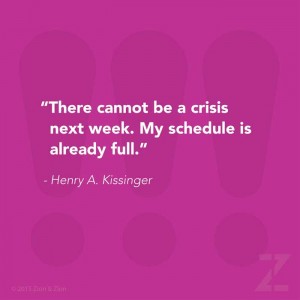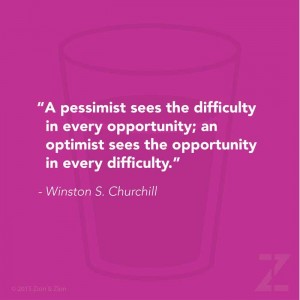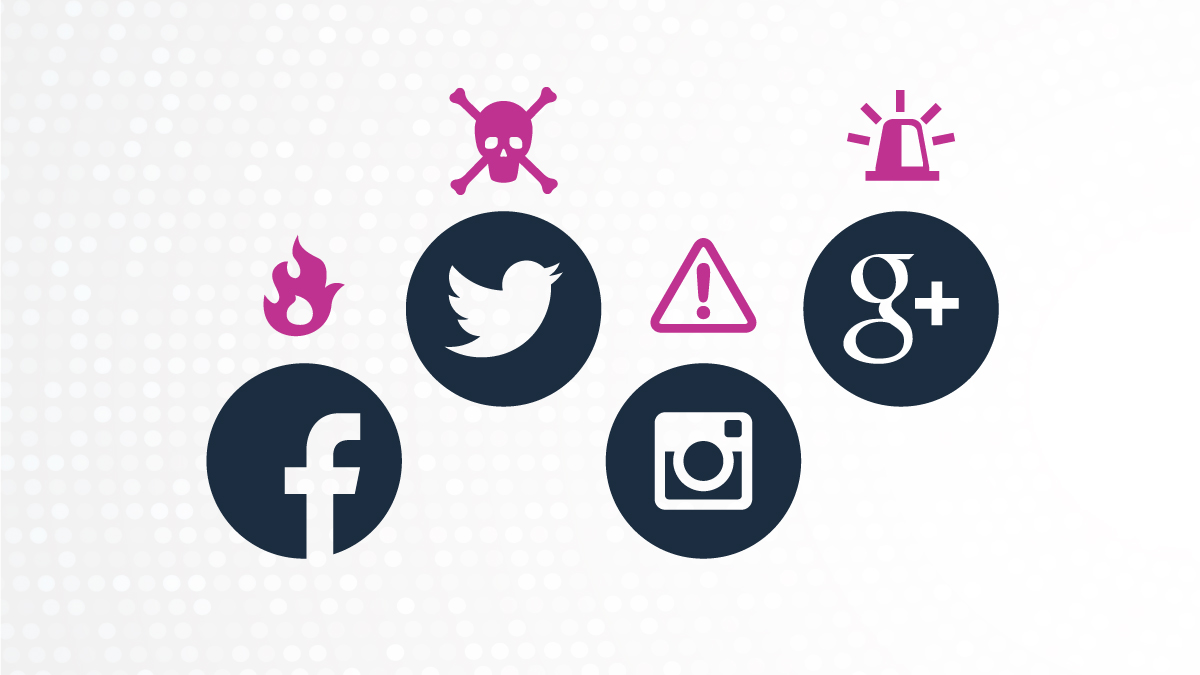You Can’t Avoid the Inevitable
Crisis. It’s a word that makes every business owner cringe, and in the realm of social media, there is no shortage of crises potential for a company. Just as there is no one business owner personality type, the world of social media crises is just as diverse.

Planned vs. Unplanned Crises
While the wide range of potential social media crises can seem daunting to a business owner or marketing professional who wants to plan ahead, these situations can be addressed by simply categorizing a social media crisis into one of two groups: “planned” and “unplanned.” No one actually plans a crisis, but sometimes there are crisis situations that you know are coming, and then there are those you do not.
To help illustrate the difference, I can highlight one real-world instance of a planned crisis that one of my client’s experienced. Our team was contacted by the media to have our client comment on a story they were about to air and publish online. The PR professional on the account dug deeper and realized a local news outlet was doing a wildly untrue exposé to discredit our client’s CEO, president, and organization as a whole. We were able to secure the date and time the story was to air and had a full plan in place to respond. In an unplanned situation, we would have had no warning and our actions would have been purely reactive instead of both proactive and reactive.
You Need a Crisis Communication Plan
That said, it’s both proactive and smart to have an overall crisis communication plan in place to help a business or organization handle a crisis swiftly, professionally, and smoothly in the public’s eye. Certain industries and verticals will require a comprehensive plan more so than others, but regardless of industry or level of risk involved in your business, every crisis communication plan should include a social media component.
Include Social Media!
A good crisis communication plan should include prepared responses, not just for traditional media, but for social media as well. With every social media platform having its own set of nuances, a prepared response will prevent you from making any best-practice mistakes in the heat of the moment. For example, on Facebook you can issue more of an official response, as it will cater to any length of a message complete with the ability to attach URLs, photos and GIFs; on Twitter you have 140 characters, including those needed for shortened URLs or photos; the list goes on and on for each platform. The platforms that are popular with the business’ target demographics should be taken into consideration during this process as well. Before, during, and after a crisis, you should anticipate a full-scale monitoring effort on social media in order to pick up on any chatter that can be leveraged and/or responded to.
To do so, prepare a list of keywords to search and monitor – if you have a social media handle like @ZIONandZION, search @ZIONandZION, #ZIONandZION, and “Zion and Zion” and “Zion & Zion.” If you know of any words, names, media outlets, phrases, etc. that are directly related to the crisis, by all means monitor those as well. Once these have been set up, it’s vital that the company respond to any and all posts (within reason) that have a neutral and negative sentiment so that it appears to the public that the company is handling the situation. If you need to take the conversation offline, then that is okay too, as long as you post a general response so others see you are responding. Conversely, also exercise caution in responding to any posts that have a positive sentiment, so that you don’t come across as arrogant. A simple ‘like’ or retweet will suffice. When selecting exactly who to respond to, give a little more caution and weight to any influencers or people with a large following (this does not insinuate you should ignore the “little people”).
Flexibility Is Key
A crisis communication plan can still be effective even if all it has is a protocol; e.g. who should respond, who is in charge, what the process looks like, etc. For example, even an unplanned crisis can utilize a prepared response, however every crisis scenario is different and official statements may need to be made tailored to the situation (including actions the company is taking). For the “lucky” ones, perhaps the situation calls for a little bit of off-the-cuff levity in direct response to the crisis at hand. Some brands are better at levity in online engagement than others, such as Taco Bell or the American Red Cross (back in /2011). If you choose an unprepared response, be sure to take your time to ensure you do not make mistakes in haste.
Don’t Get Personal
As you can tell, handling a crisis on social media is all about appearances. Regardless of the voice a company may have, the voice during a crisis should be adjusted accordingly; most likely it’s not the time for sarcasm or outright humor. This is also important because one of the biggest rules a company can follow in any planned or unplanned crisis is to maintain professionalism and not take negative reviews or posts personally! Often done in haste, this can be particularly difficult for smaller businesses which do not involve marketing professionals. One perk to having professionals handle social media is the mild level of detachment from the emotional side of running a business. Simply look at one of Phoenix’s very own businesses, Amy’s Baking Company.
In 2013, this locally owned company made national news very quickly for what is now considered one of the most epic brand meltdowns on Facebook up until that point. Not only could they not control themselves and either abstain from responding, or simply respond professionally, they took their lack of professionalism even further and kept lying in their interaction with the public. This alone took their situation from a social media nightmare to a fully-fledged public relations nightmare. However, the tactics that Amy’s Baking Company utilized are not just typical of small businesses; corporations are also prone to making similar mistakes.
Don’t “ScapeTern”
One lie that Amy’s clung to at one point during the fiasco was that their social media accounts had been hacked – they claimed the unprofessional chaos that ensued was not actually done by them. Corporations have made it a habit of making similar claims, albeit for a random tweet here or there (some of which /possibly were hacked). Then there is also my personal favorite claim: an intern did it. Even /organizations and political campaigns are prone to this one. Various political social media crises caused analysts and reporters to coin the blaming of an intern, “/ScapeTern.”
Not only should companies take responsibility for their actions, especially on social media since a screen shot is very easy to take and can live on the web long after the tweet is deleted, they (especially major corporations) should take social media seriously enough to have a team of actual employees (or professionals) managing it! There are many lessons to be learned from every social media crisis, and Amy’s Baking Company is no exception.
When Bad Things Happen to Good Companies
It’s important to note that sometimes companies do act responsibly; they have trained social media staff and they do not get hacked. Sometimes they simply have a campaign idea take off in an entirely unanticipated direction, hashtags get hijacked, or they have real-time monitoring tactics go awry. These types of crises are occurring more and more. As companies attempt to tackle social media on a strategic level, more ideas are being put to the test! However, all of these good intentions don’t prevent you from having a crisis occur. Recent examples to be learned from include DiGiorno’s strange attempt to hijack /#WhyIStayed, or US Airways’ NSFW /snafu (actually NSFW – not safe for work – but still an important example).
The One Man Show

Finally, a social media crisis for the entrepreneur with a very personal online brand where the person—name, face, identity—IS the brand, may look very different from that of a “traditional” company or brand. Also potentially known as an influencer in the world of social media, the strategies that work for your everyday professional will also help prevent an “identity crisis,” if you will, for an influencer when fully implemented. Stalking, privacy invasion, photo theft, personal information leaks, and even intellectual property theft are just some of the social media crises a social media entrepreneur should work hard to prevent. The steps to prevent these things from occurring can be basic, but there are /resources online to help you on your way.
